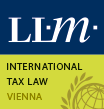Georg Kofler
DDr. Georg Kofler, LL.M. is professor of international taxation at the Institute for Austrian and International Tax Law at WU as Professor for International Tax Law. He has earned a doctorate in law as well as a doctorate in business administration in 2002 and 2003, respectively, and an LL.M. in international taxation from New York University in 2004. In 2006, he received his postdoctoral lecturing qualification (“habilitation”) with a thesis on “Double Taxation Conventions and European Community Law”, which was awarded, inter alia, IFA’s Mitchell B. Caroll Prize. He has gained practical experience in the International Department of the Austrian Federal Ministry of Finance (2002-2003, 2009) and as a member of a firm specializing in providing expert opinions and scientific studies in all fields of taxation. Before joining WU in 2020, he was as an assistant professor at the University of Linz (2001-2006), an Acting Assistant Professor of Tax Law at New York University School of Law (2006-2008) and a tax professor and head of the tax law institute at the University of Linz (2009-2020). He also served as a visiting professor at the University of Florida (2013 and 2018), the University of Sydney (2016) and New York University (2019). Georg has worked in the field of taxation, especially European and international taxation, for more than 20 years and is involved in tax research, training and education at institutions mostly in Europe and the United States. He is part of formal and informal research networks and serves, inter alia, as the chairman of CFE Tax Advisers Europe’s ECJ Task Force. He has published and lectured widely on issues of Austrian, international and European taxation. His publications include several monographs, anthologies as an editor, and more than 500 articles, book chapters, reviews of court decisions and other contributions in academic journals and anthologies; he has given more than 400 talks and lectures before academic or professional audiences.Courses:
Tax Planning under European Tax Rules
The EU fundamental freedoms and secondary law provide companies with opportunities to structure their tax affairs efficiently and neutrally (e.g., the Parent-Subsidiary-Directive and the Interest-Royalties-Directive), but EU state aid law and secondary law also set limits to tax planning (e.g., the Anti-Tax Avoidance and the Unshell Directives). This course will create a basis for understanding the European framework for cross-border tax planning and its limits.
Back to list

